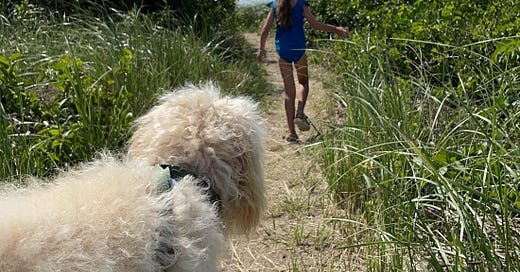How to Raise Kind(er) Kids Without Being a Parenting Saint
A real-life, age-by-age guide to modeling empathy (not perfection) without sticker charts or superhuman patience.
I was on the phone with my sister, venting about a neighbor who'd let their dog poop in our yard. Again. For the millionth time. Where my kids play barefoot.
"It is so rude and I’m pissed," I muttered, rolling my eyes dramatically even though no one could see me. "It's not that hard to bring a bag, and don’t even get me started on those retractable leashes and letting the dog come midway up my yard to go. I have asked him nicely three times."
I didn't think my 6-year-old was paying attention. She was deep in some elaborate pretend scenario with her unicorns across the room. But three days later, when I picked her up from the bus stop, I realized how wrong I was.
With her pink checkered backpack slung low on her back, she used one hand to hold her grubby water bottle, the one with the rainbow puffy sticker half-peeled off, and the other hand gesticulated wildly with the story she was telling me.
“Mom. I told Henry he can’t play with us if he keeps making up his own rules to the game. WE are the unicorns and HE is the dragon. He’s supposed to chase us, but not catch us, and he keeps catching us. It makes Simma cry. I told him nicely three times. It’s so rude and I am pissed,” she exclaimed.
I nearly dropped her lunchbox on the dirt path we took home every day.
Excuse, me what did you just say?
“It’s so rude and I’m pissed,” she repeated, only this time her voice was more hesitant as she realized that she might have said something she wasn’t supposed to say.
Oops. She wasn’t being rude. She was being me.
Time to backtrack and be more intentional about teaching my daughter some life skills.
I was thrilled that she advocated for herself and her friend, but I needed to teach her appropriate ways to express frustration so her message wouldn't be misconstrued.
The truth about raising kind(er) kids
We all say we want to raise kind humans. We buy books about sharing and inclusion. We remind our kids to say please and thank you approximately 872 times a day. We lecture about being a good friend and to “behave well” at school.
“Be kind!” We say. “Be a good friend today,” we murmur as they get out of the car at the preschool carline.
In theory, those things sound good, but most of the time, those lectures are just performative and mean nothing to our kids. The message is vague and they need concrete modeling to understand.
Children don’t learn to be kind from quick phrases we throw at them as we part ways. They learn it from what we actually do when:
The waiter gets our order wrong and we have three hungry kids
Someone cuts us off in traffic when we are late for school
Their substitute teacher runs behind schedule and you’re rushing them to their after-school activity
Kids learn how to treat others by watching us navigate the everyday moments that test our patience. Some days, I'm not the kind of role model I’d like to be. Shocker, I know (kidding!!). So I made a plan for backtracking. I'm big on sharing my mistakes out loud with my kids as they happen, so they see no one is perfect and everyone is still growing.
So how do we attempt to raise kind kids when we're exhausted, over it, and just trying to make it through dinner?
I’ve used my early childhood background and my work as a parenting coach to break this down by age (2-10), with real strategies that don't require you to become a parenting saint. You don’t have to overhaul your parenting or “fix” your child. Instead, I am going to show you how to use your child’s developmental stage to make some simple, but deeply impactful tweaks in how you are teaching kindness and inclusion through your actions.
Become a paid subscriber to access: ✓ Age-specific, developmentally appropriate strategies for modeling kind(er) Behavior (ages 2-10) ✓ Exact phrases to teach your child for different situations ✓ How to manage on the days you don’t feel up to it ✓ How to balance perfection with growth
Plus, get access to the archive of parenting guidance, including:
Let's Talk Clean Up Time (The Why Behind the Struggle)/The Cleanup System That Works/Age-By-Age Expectations/ When Cleanup Feels Impossible/ Phrases That Build Cooperation
What's Really Happening When Kids Compare Your Rules to Others
When Your Child Starts Comparing: "But Everyone Else Is Allowed!"
A Child Was Teasing My 3-Year-Old at the Park and the Other Parent Didn't Step In. Here's What I Did
What Your Child Really Needs When They Cry: How to Set Limits and Still Validate Feelings (Toddler to Tween)
And more…
Subscribe now to unlock this article and join hundreds of parents just like you who want real-life ideas for more connection, less chaos, and a childhood that feels like childhood.
Keep reading with a 7-day free trial
Subscribe to The Workspace for Children to keep reading this post and get 7 days of free access to the full post archives.





